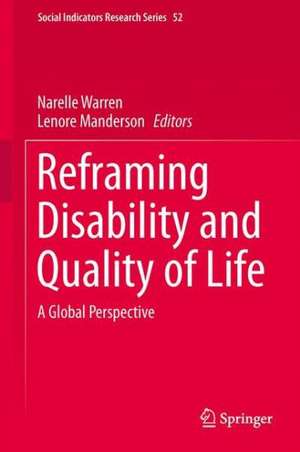Reframing Disability and Quality of Life: A Global Perspective: Social Indicators Research Series, cartea 52
Editat de Narelle Warren, Lenore Mandersonen Limba Engleză Hardback – 23 mar 2013
| Toate formatele și edițiile | Preț | Express |
|---|---|---|
| Paperback (1) | 713.70 lei 6-8 săpt. | |
| SPRINGER NETHERLANDS – 7 apr 2015 | 713.70 lei 6-8 săpt. | |
| Hardback (1) | 720.68 lei 6-8 săpt. | |
| SPRINGER NETHERLANDS – 23 mar 2013 | 720.68 lei 6-8 săpt. |
Din seria Social Indicators Research Series
- 15%
 Preț: 601.13 lei
Preț: 601.13 lei - 5%
 Preț: 861.64 lei
Preț: 861.64 lei - 18%
 Preț: 945.47 lei
Preț: 945.47 lei - 15%
 Preț: 644.30 lei
Preț: 644.30 lei - 18%
 Preț: 959.50 lei
Preț: 959.50 lei - 15%
 Preț: 645.60 lei
Preț: 645.60 lei - 18%
 Preț: 1234.94 lei
Preț: 1234.94 lei - 15%
 Preț: 640.06 lei
Preț: 640.06 lei - 15%
 Preț: 635.47 lei
Preț: 635.47 lei - 5%
 Preț: 1105.21 lei
Preț: 1105.21 lei - 15%
 Preț: 646.11 lei
Preț: 646.11 lei - 18%
 Preț: 1233.06 lei
Preț: 1233.06 lei - 18%
 Preț: 953.03 lei
Preț: 953.03 lei - 5%
 Preț: 1101.37 lei
Preț: 1101.37 lei - 15%
 Preț: 644.82 lei
Preț: 644.82 lei - 18%
 Preț: 948.92 lei
Preț: 948.92 lei - 15%
 Preț: 642.51 lei
Preț: 642.51 lei - 18%
 Preț: 954.45 lei
Preț: 954.45 lei - 18%
 Preț: 1235.76 lei
Preț: 1235.76 lei -
 Preț: 407.56 lei
Preț: 407.56 lei - 15%
 Preț: 642.83 lei
Preț: 642.83 lei - 18%
 Preț: 955.70 lei
Preț: 955.70 lei - 15%
 Preț: 644.49 lei
Preț: 644.49 lei - 18%
 Preț: 952.89 lei
Preț: 952.89 lei - 15%
 Preț: 648.89 lei
Preț: 648.89 lei - 15%
 Preț: 645.47 lei
Preț: 645.47 lei - 18%
 Preț: 1224.54 lei
Preț: 1224.54 lei
Preț: 720.68 lei
Preț vechi: 758.60 lei
-5% Nou
Puncte Express: 1081
Preț estimativ în valută:
137.92€ • 142.48$ • 114.78£
137.92€ • 142.48$ • 114.78£
Carte tipărită la comandă
Livrare economică 26 martie-09 aprilie
Preluare comenzi: 021 569.72.76
Specificații
ISBN-13: 9789400730175
ISBN-10: 9400730179
Pagini: 200
Ilustrații: XV, 243 p.
Dimensiuni: 155 x 235 x 20 mm
Greutate: 0.54 kg
Ediția:2013
Editura: SPRINGER NETHERLANDS
Colecția Springer
Seria Social Indicators Research Series
Locul publicării:Dordrecht, Netherlands
ISBN-10: 9400730179
Pagini: 200
Ilustrații: XV, 243 p.
Dimensiuni: 155 x 235 x 20 mm
Greutate: 0.54 kg
Ediția:2013
Editura: SPRINGER NETHERLANDS
Colecția Springer
Seria Social Indicators Research Series
Locul publicării:Dordrecht, Netherlands
Public țintă
ResearchCuprins
Preface and Acknowledgements.- List of Tables.- List of Figures.- Prologue - Devva Kasnitz.- Reframing disability and quality of life: Contextual nuances - Narelle Warren and Lenore Manderson.- Stroke and aphasia in a South African Township - Carol Legg and Claire Penn.- Disability and wellbeing in Northern Nigeria - Elisha P. Renne.- Children’s dignity of life: How to evaluate bodies’ (im)permeability - Rafael Wainer.- Who, how and what? Quality of life and cancer research - Helle Ploug Hansen and Tine Tjørnhøj-Thomsen.- Quality of life and end of life decisions after brain injury - Athena Demertzi, Olivia Gosseries, Didier Ledoux, Steven Laureys and Marie-Aurélie Bruno.- Kidney transplantation in Cyprus: A culture of constructing and reconstructing normality - Costas S. Constantinou.- Spinal cord injury, sport, and the narrative possibilities of posttraumatic growth - Andrew C. Sparkes and Brett Smith.- Narrating a return to work after spinal cord injury - Carolyn Smith-Morris, Gilberto Lopez, Lisa Ottomanelli and Lance Goetz.- Sports, disability and the re-framing of the post-injury soldier - Seth D. Messinger.- Care, dependency and quality of life - Lenore Manderson and Narelle Warren.- Disability and caregivers’ inability among immigrant Australians - Victoria Team and Milica Markovic.- The impact of government on quality of life for people with disabilities in the U.S. and Guatemala - Erica Skogebo Edwards.- About the authors.- Index
Recenzii
From the reviews:
“This book, consisting of 13 chapters, will be of interest to educators, policy makers, health care providers, people with and without disabilities and their families, and caregivers. … This collection of stories, illustrations, and reports provides an eye-opening experience for the reader. … Reframing Disability and Quality of Life will provide insight regarding disability education, communication, and awareness for professionals in the areas of medicine, health care, disability policy and practice, and community outreach and services and in the field of education.” (Karen A. Myers and Crystal Botkin, PsycCRITIQUES, Vol. 58 (46), November, 2013)
“This book, consisting of 13 chapters, will be of interest to educators, policy makers, health care providers, people with and without disabilities and their families, and caregivers. … This collection of stories, illustrations, and reports provides an eye-opening experience for the reader. … Reframing Disability and Quality of Life will provide insight regarding disability education, communication, and awareness for professionals in the areas of medicine, health care, disability policy and practice, and community outreach and services and in the field of education.” (Karen A. Myers and Crystal Botkin, PsycCRITIQUES, Vol. 58 (46), November, 2013)
Notă biografică
Dr Narelle Warren holds a NHMRC Postdoctoral Research Fellowship to investigate trajectories of stroke and Parkinson’s Disease in European- and Indian-Australian communities. Her doctoral research explored the intersection of health, self-management and health-seeking behaviours and practices in an isolated community. More recently, she conducted a large study investigating how people adapt to a lower-limb amputation based in four hospital settings; this involved a detailed qualitative analysis of quality of life measures. Narelle conducts qualitative and ethnographic research into how understandings and experiences of chronic conditions vary according to gender, age, geographical location, and culture. In addition, she is a chief investigator in a study exploring how patients’ perceptions of preventive health change by sociocultural location. Lenore Manderson is Professor of Medical Anthropology at Monash University. Her interests include the anthropology of chronic conditions and disability, infectious disease in resource- poor settings, gender and sexuality, and questions of embodiment and identity. She was an inaugural ARC Federation Fellow at The University of Melbourne then Monash University. Under this prestigious award, she conducted research on chronic illness, disability, social relationships and well-being, including an inter-disciplinary multi-country study on social and cultural impact of chronic illness and disability in Australia and Southeast Asia. Through this study, she developed an impairment-specific quality of life measure, the PIPP scale. Previously she was Director of the Key Centre for Women’s Health in Society (1999-2002), and prior to that, from 1988-1998, Professor of Tropical Health at The University of Queensland. Lenore’s focus is on postgraduate training, and she has been internationally acknowledged for her commitment to mentoring and training of HDR students; she has supervised to graduation over 60 doctoral studentsand 40 honours and masters students working in the fields of public health and medical social sciences, in immigrant, Indigenous and majority communities in Australia, and in diverse settings in Asia and Africa. Half of her students are international. She has edited or co-edited 14 collections, and has authored or co-authored some 500 works in total; she is editor of the journal Medical Anthropology.
Textul de pe ultima copertă
Chronic conditions and physical impairments can take a psychological, social and economic toll, and are assumed to diminish a person’s quality of life. But ‘quality of life’ is an ambiguous phrase. Some use the term as an indicator for successful and high quality health services, including good access to medical attention and surgery; others use the term to argue against medical interventions that are seen to prolong life for its own sake. The meaning of ‘quality of life’ varies from person to person, and so is contextually fluid: it may be shaped by health status, presence or absence of pain, happiness and acceptance, or fluctuations in social and economic status. The authors in this book offer a unique and timely collection of papers that address many of these issues, in the context of the lived experience and subjective wellbeing of people with a range of medical conditions from very different cultural and economic environments. In doing so, they address the limits of psychometric measurement and the challenges in generating information about quality of life and wellbeing at both individual and population levels. Authors confront the obstacles of interpreting health outcomes among people of different cultures, ages, genders and health statuses, so supplementing quantitative data with rich ethnographic discussion and illustrating the value of mixed methods research. This book is fundamental to the emerging debates related to individual health outcomes. In striving to understand the broader contextual factors of chronic illness and disability, this volume will contribute to our knowledge of the services, support systems and infrastructure that provide a higher quality of life to people, regardless of their physical health, capability and functioning.
Caracteristici
Unique and timely collection of papers of interest to the broad range of social scientists concerned with chronic illness & disability Discusses for the first time the lived experience and subjective wellbeing of people with medical conditions and impairments from a variety of cultures across the globe Addresses the limits of psychometric measurement and the challenges in generating information about quality of life and wellbeing













